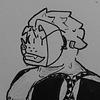You need to sign in or sign up before continuing.
Take a photo of a barcode or cover

goodjobrammy 's review for:
Tintin in the Land of the Soviets
by Hergé
adventurous
funny
fast-paced
Plot or Character Driven:
Plot
Strong character development:
No
Loveable characters:
Complicated
Diverse cast of characters:
No
Flaws of characters a main focus:
No
I didn't expect to like this one, and I was not surprised. It's not, after all, a shock that a conservative French Catholic newspaper in 1929 had strong anticommunist opinions, and it's hardly worth mentioning that those opinions are completely unsubstantiated (although two points do stick out to me as particularly funny – the "hideout where Lenin, Trotsky, and Stalin have collected together wealth stolen from the people" which is disguised as a haunted house, and the Soviets' ultimate plan, which is to "blow up all the capitals of Europe with dynamite.") Regardless, a story that doesn't agree with my admittedly radical politics can still occasionally redeem itself on technical grounds, and if Hergé is on form then perhaps this story can be salvaged.
Well, no, it can't, because you saw the amount of stars this story got from me. No one hits it out of the park on their first comic, and Hergé very quickly improves in just about every way in future Tintin stories, but – let's just rattle some points off, shall we? The plot doesn't resolve as much as it just runs out of ludicrous things to say about the USSR. The pacing is atrocious – it's my assumption that this story was very lightly edited if at all when compared to future stories, but even if you tried to edit this down to the size of Tintin in America, you'd end up with a fever dream. The sense of stakes is absurd: Tintin miraculously survives being T-boned by a train, and the next Soviet attempt on his life is a banana peel in a doorway. I'd be remiss, of course, if I didn't mention how Hergé's extremely nasty Sinophobia is already manifest here. Also, Tintin's plaid outfit looks stupid.
If there are redeeming qualities to this story, they are these: Snowy and Tintin's rapport comes basically fully formed here, and adds a needed sense of humor to the proceedings. In general, when he isn't writing the most wretchedly flat Russians to walk the literary world, Hergé has an ear for dialogue. But these don't amount to a reason to read this story. Indeed, the nicest thing you can say about this story is that – even though it's long for a Tintin story – at 138 pages, it's mercifully short.
Well, no, it can't, because you saw the amount of stars this story got from me. No one hits it out of the park on their first comic, and Hergé very quickly improves in just about every way in future Tintin stories, but – let's just rattle some points off, shall we? The plot doesn't resolve as much as it just runs out of ludicrous things to say about the USSR. The pacing is atrocious – it's my assumption that this story was very lightly edited if at all when compared to future stories, but even if you tried to edit this down to the size of Tintin in America, you'd end up with a fever dream. The sense of stakes is absurd: Tintin miraculously survives being T-boned by a train, and the next Soviet attempt on his life is a banana peel in a doorway. I'd be remiss, of course, if I didn't mention how Hergé's extremely nasty Sinophobia is already manifest here. Also, Tintin's plaid outfit looks stupid.
If there are redeeming qualities to this story, they are these: Snowy and Tintin's rapport comes basically fully formed here, and adds a needed sense of humor to the proceedings. In general, when he isn't writing the most wretchedly flat Russians to walk the literary world, Hergé has an ear for dialogue. But these don't amount to a reason to read this story. Indeed, the nicest thing you can say about this story is that – even though it's long for a Tintin story – at 138 pages, it's mercifully short.
Graphic: Racism